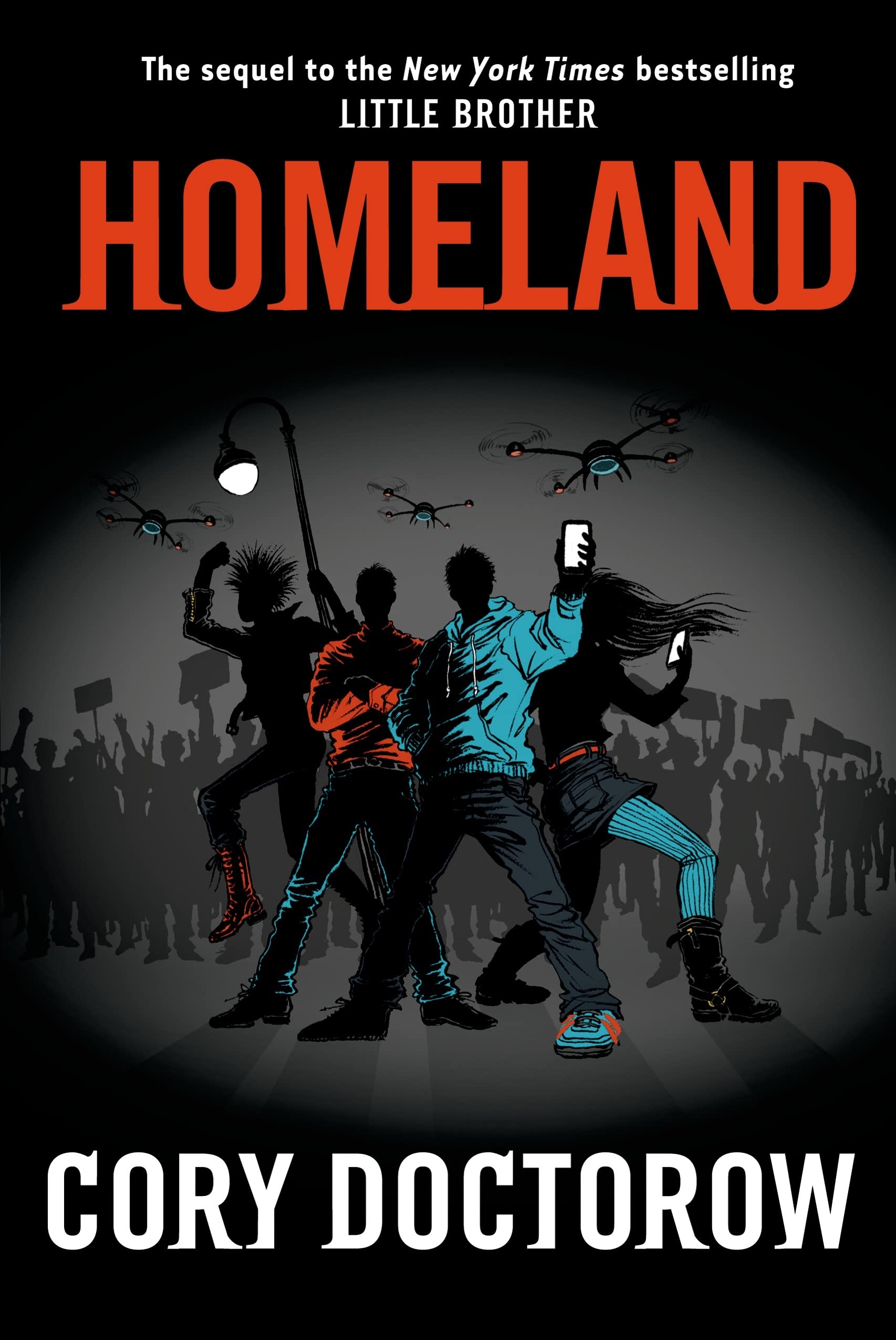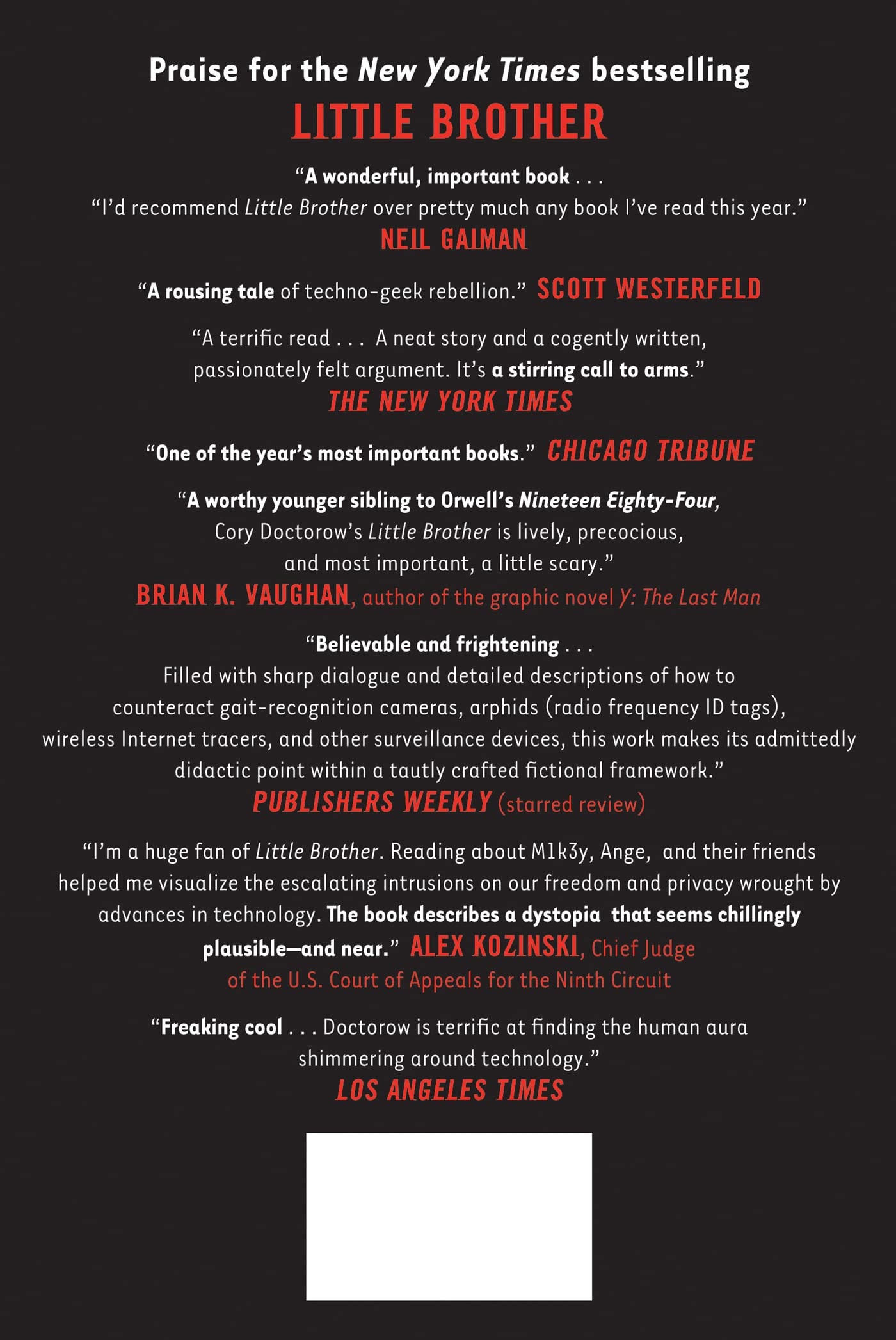Customer Services



Full description not available
W**G
Fantastic novel, either as standalone or sequel
I read and loved Little Brother when it came out two years ago, but I was fuzzy on the details by the time I got around to Homeland, its sequel. So I approached Homeland essentially as a stand-alone novel.Both are dystopian novels about surveillance societies, but in many ways, Homeland is a more immediate, present day thriller. The vast majority of surveillance technology Doctorow describes exists now, and is already deployed in schools and by governments and corporations. Schools are today monitoring kids, taking pictures of them at school, in their homes, in various states of undress. Governments are installing spyware, with its own weaknesses that then make it easier to for criminals to get access to your computer. Companies are turning vast quantities of personal data into ever-more targeted marketing.While I recall being outraged at the spectre of draconian surveillance in Little Brother, that feeling turned more to fear in Homeland. The future is here, and it's not pretty.As another reviewer noted, 'Severe Haircut Lady' is not very threatening as the villain of the story, but I would say the true antagonist is the surveillance state itself, rather than any one person.Like most Doctorow novels, Homeland is one third entertainment, one third education about the state and direction of technology's influence on us, and one third practical lessons in privacy defense. Since reading it I've changed and lengthened passwords, turned on two-factor authentication, encrypted hard drives, and started using a secure VPN.This is the sort of novel I'd want my kids to read as teenagers: to learn when and where it's appropriate to question authority, how to act independently and responsibly, and to see positive examples of how they can create change in the world. I attended Cory Doctorow's reading for Homeland in Portland, and was heartened to see teenagers present at the talk who went on to ask intelligent questions about copyright laws, remixing, and rooting phones.It's a fun read (you'll certainly get caught up in the story, and I did as well, finishing it over three evenings), and it's probably one of the most important books you could read this year.
W**D
Engaging and provocative
I approached this one with a little trepidation after "Pirate Cinema," which felt more like a political statement than a novel. Nothing wrong with a political statement in a novel at all, but it just wasn't pulled off well. No such problem here: Doctorow balances educating his audience about electronic freedom and the surveillance state with a fast-paced story and good character development, resulting in a good read for adults and young adults a like. Give this book to a smart kid you know to inspire them. Or to an adult; it inspired me to join EFF. Well done Mr Doctorow!
A**R
A great entertaining intro on hacktivism.
1. It's a great introduction to the following themes (introduction, as in "for dummies"): hacktivism, online privacy, how technology can badly affect the power of governments over their citizens, using technology for political campaigns.2. It's very entertaining. I am a difficult reader and have finished the book in three days, which is very fast for me.3. Writing style is very ok for this type of book, that aims at a lot and tends to achieve little. He writes competently, although not brilliantly, and I think he is ok with that.I read it because Aaron Swartz liked it, really. And I agree with him on what he said.
M**N
another engrossing tale
Doctorow has a way of building characters and telling a story that is unbelievably realistic. Sure, he borrows from the latest real-life tech & politics. Anyone could do that. But only Doctorow can weave it all into a story that just can't be set aside. When I visited craphound recently after an extended sabbatical, that he had produced a few more books since Little Brother. Soon after diving in to Homeland, I could tell the book was another of his detailed and realistic masterpieces.Doctorow crafts worlds / lives that you just want to be a part of. (Apologies for the dangling participle)
M**E
Book number two of a two book dystopian near future series
Book number two of a two book dystopian near future series. I don't have a clue if there will be a third book in the series and I don't know if I will read it if so. I read the trade paperback which used nice paper and a good font for my old eyes.Things are going to heck in a hand basket in near future San Fransisco as the number of employed people is steadily dropping. Marcus has dropped out of college and is desperately looking for a job. And people are looking for Marcus. I could not tell when the book is set other than the near future (it was published in 2013).There is a huge backstory going in the book about the high cost of college education in the USA and some apparent usury going on in student loan fees. I have no idea about the student loan usury. And yes, college has gotten very expensive in the USA.There is a public domain version of the book at craphound.com.
A**Z
SO GOOD
This is one of the mot intense books I've read in a very long time. Cory has the very special ability to make you forget your surroundings when you're reading his books, and 'Homeland' does that in spades.The chilling part of this is, that I, as a person with 20+ years in the IT industry, have a very good grasp of the tech that Cory describes in this novel and I know for a fact that it's most certainly NOT science fiction.That's what I love so much about Cory's books. He weaves in everyday computing concepts that add a level of hyper-realism to his novels that is hard to find elsewhere.Homeland was awesome. STRONGLY recommended.
J**K
Great story, ever more relevant
Superb sequel to Little Brother, with all the thrilling plot, well-informed technology, teenage love and strong opinions on coffee you could hope for. Read if you want be be justifiably angry with the world, and equipped with a few ideas to make things different.
J**N
Five Stars
I love the book. But make sure you read Little Brother before this one!
S**N
Fesselnd, unterhaltsam, nachdenklich..
Wie schon beim Vorgänger eine interessante Erzählweise, bei der dem Leser im Laufe der Story sowohl grundsätzliche Überlegungen zum Thema Überwachung/Demokratie/Freiheit sowie ein paar technische Konzepte zum Thema Internet-Sicherheit und Privatsphäre erklärt werden.Mit Nachworten von Jacob Applebaum und Aaron Schwartz quasi der direkte Einstieg für den angehenden Hacker, und immerhin unterhaltsames SciFi für alle die die Diskussion/Technik schon kennen.Ein interessanter Twist sowohl in Homeland als auch Little Brother, ist dass der Erfolg am Ende nicht durch die Technik erzielt wird. Die Romane sind hier und in anderen Aspekten wesentlich bodenständiger/realitätsnaher als der typische Cyberspace SciFi, und aus meiner Sicht durchaus eine neue oder wenigstens direktere Art, sich mit aktuellen Problemen auseinander zu setzen.
D**T
Il seguto di "Little brother"
Non bello come il primo capitolo ("Little Brother") , ma comunque un bel libro.Adatto più' agli adolescenti che agli adulti.Raccomando la versione inglese, Cory Doctorow è un bravissimo scrittore, piacevole e facile da leggere. Avevo provato la traduzione italiana di "Little Brother" ma non è all'altezza.
A**S
Good sequel to 'Little Brother'
A slightly older Marcus Yallow returns for some more adventure. The world hasn't gotten any better since 'Little Brother' and wrongs must be righted. Includes wonderful cameo's by some truly awesome geeks!
Trustpilot
2 weeks ago
3 weeks ago